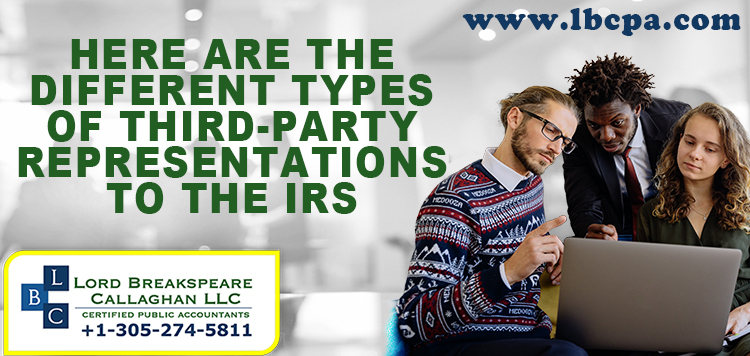LBCPA News 
Click here to go back
Know the Different Types of Authorizations for Third-Party Representatives

Taxpayers can authorize a third-party representative to work with the IRS on their behalf. Sometimes this person is an unpaid family member or friend, and sometimes this is a tax professional hired by the taxpayer. Different types of representatives need different authorizations before they can represent the taxpayer to the IRS.
Taxpayers who want to have a third party represent them must formally grant them permission to do so.
Here are different types of third-party authorizations:
- Power of Attorney – Allows someone to represent a taxpayer in tax matters before the IRS. With this authorization, the representative must be an individual authorized to practice before the IRS.
- Tax Information Authorization – Appoints a person to review or receive a taxpayer's confidential tax information for the type of tax for a specified period.
- Third Party Designee – Designates a person on the taxpayer's tax form to discuss that specific tax return and tax year with the IRS.
- Oral Disclosure – Authorizes the IRS to disclose the taxpayer's tax info to a person the taxpayer brings into a phone call or meeting with the IRS about a specific tax issue.
Revoking a third-party authorization
A taxpayer can choose to revoke any authorization at any time.
Third-Party Designees and Oral Disclosures expire automatically. An Oral Disclosure Authorization may expire at the end of the conversation but can also be granted for longer if the taxpayer wants IRS to have a continuing conversation with the designated third party until the tax matter is resolved. A Third-Party Designee authorization ends one year from the due date of the relevant tax return.
Power of Attorney and Tax Information Authorization stay in effect until the taxpayer revokes the authorization or the representative withdraws it. There are two ways for a taxpayer to revoke either of these authorizations:
1. Authorize a new representative. If a taxpayer authorizes a new representative for the same tax matters and periods/years, the new authorization will automatically revoke the prior authorization unless the taxpayer chooses to retain the prior representative by checking the box to retain and attaching prior copies of any authorization they want to remain in effect.
2. Send a revocation to the IRS. Taxpayers can follow the revocation instructions in Form 2848, Power of Attorney and Declaration of Representative for Power of Attorney. For Tax Information Authorizations, they should follow the revocation instructions for Form 8821, Tax Information Authorization.
Even with an authorized third party representing them, taxpayers are ultimately responsible for meeting their tax obligations.
Low-income representation
Low-Income Taxpayer Clinics are independent from the Internal Revenue Service and the Taxpayer Advocate Service. LITCs represent individuals with income below a certain level who need to resolve tax problems with the IRS. These clinics can represent taxpayers in audits, appeals and tax collection disputes before the IRS and in court. In addition, LITCs can provide information about taxpayer rights and responsibilities in different languages. Services are free or may cost a small fee.
If you have any questions regarding Essential Business Accounting, Domestic Taxation, International Taxation, IRS Representation, U.S. Tax Implications of Real Estate Transactions or Financial Statements, please give us a call at +1-305-274-5811.
Source : IRS






